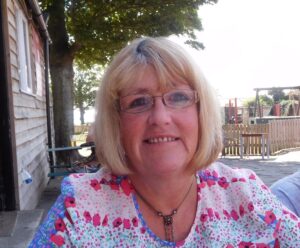Subscribe to trusted local news
In a time of both misinformation and too much information, quality journalism is more crucial than ever. By subscribing, you can help us get the story right.
- Subscription costs less than £1 a week with an annual plan.
Already a subscriber? Log in here.
29
May 2020
COLUMN: Home once a week for love and cuddles

This column is written for The Stray Ferret by Kate Simpson, who's 16 year old daughter, Tess, graduated from Henshaws College a few years and is now able to live independently in a assisted living home. Kate is a fundraiser for Henshaws charity.
Our daughter Tess is Autistic. At the age of sixteen, as if her plate were not already full enough, a rare brain tumour left her with a severe visual impairment and an array of complex medical conditions we had never even heard the names of.
So, in the very beginning of all this strangeness, I felt my heart begin to quicken, to skip the odd beat and send hurtling, through my whole body, an all too familiar and overwhelming sense of dread and a very specific kind of fear. How was I going to protect her from, explain to her about, and minimise the impact of this brand-new imposter in her life? Throughout her diagnosis, illness, operations, and treatments we had made all the decisions for her. We did the research, we had the conversations, we set the time scales and we made the plans. Most importantly, we were able to defend her world and keep it as comfortable, and as safe as was humanly possible.
This was going to be hugely different. This was completely outside of our control.
Peculiarly, that substance called Adrenalin, which seemed to be almost bursting from my every vein is one of the things which Tessa’s body is no longer able to produce, and a main reason for her highly compromised immune system. We knew the letter was coming.
How could I possibly begin to shelter this independent young woman, no longer under our roof and happily going about her daily life in her assisted living accommodation?
Of course, her physical safety has been a huge concern. For Tess, contracting Covid would be truly life threatening. Fortunately, I learnt incredibly early in her journey along the path to independence that unless I could let go and employ the “trust” factor, that journey would be short and unfulfilled. This situation was calling for a whole different level of trust.
Should we bring her home, tear her away from the place and the people she now felt so secure with. If we did, could we keep her safer. Would we be setting her back; would she ever want to go through the process of leaving us again. Could we even cope with working from home and a full time Tessa. Could she cope with a full time Mum and Dad?
When the letter landed on the door mat, we were told that we would not even be able to visit her for twelve long weeks. The one thing I knew with absolute certainty was that Tess would never be able to understand this. Her life, overnight, had been stripped of all routine and security. There were no outings or external activities. No trips, even to McDonalds, and familiar smiles had been covered with anonymous blue face masks.
Because we were both self-isolating, we were able to successfully challenge the decision. For someone with an adrenal insufficiency, increased levels of stress can be just as detrimental to physical health as any external virus or resulting illness. We have been incredibly lucky. Our girl has been able to come home every Saturday for love and cuddles and a slice of normality. We have been able to give her our own brand of emotional support, as well as support her staff and carers to deliver theirs. I cannot begin to imagine how life during this time could have been for us, has been, for so many others.
Tess is fit and well and coping brilliantly. We have found ways to overcome some of the challenges and to live alongside the others.
My heartbeat, along with the rest of the population’s, is as regular as current circumstances allow, because once a week, I get to hear hers. To feel hers and to see it radiate out in her smile.
Kate's experiences of Tess' care at Henshaws have resulted in her being a fundraiser for them. Want to help support those – likes Tess – living with disability? You can donate online at www.henshaws.org.uk
0